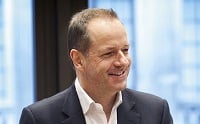GlaxoSmithKline ($GSK) CEO Andrew Witty says he's a "huge bull" on India, despite the ongoing patent-rights tug-of-war between foreign drugmakers and domestic officials. Now, Witty is putting another $1 billion where his mouth is.
 |
| GSK CEO Andrew Witty |
GSK plans to spend about £629 million ($1.02 billion) to raise its stake in its Indian pharmaceutical unit to as much as 75%. That's on top of the $1 billion or so it plowed into its Indian consumer healthcare unit earlier this year.
Essentially, GSK is doubling down on its Indian bets. The country is one of the fastest-growing pharma markets in the world, and the promise of a payoff there remains strong, despite the intellectual property disputes of the past couple of years.
Witty has been one of the most vocal proponents of expansion in India, on India's terms, saying that drugmakers should price their products according to a country's ability to pay. GSK has discounted its drugs and vaccines significantly in several emerging markets, believing that market share and volume growth will pay off, even at low prices. Last year, 26% of Glaxo's sales came from emerging markets, or about $11 billion, according to FiercePharma's ranking of top drugmakers in those countries.
"If you look at GSK's history, it's a more 'Indian' [multinational] pharma company than any other," Indian industry analyst Kewal Handa told MoneyControl. "It has been launching products at local prices. ... To be on top in all emerging-market countries to my mind is GSK's top priority."
Glaxo isn't the only major drugmaker to take a low-cost approach in India. Sanofi ($SNY) has been slashing its own prices in emerging markets as a way to build market share as countries grow their healthcare systems and drug spending. Roche ($RHHBY) teamed up with an Indian biologics maker to sell low-cost versions of its top cancer drugs at discounted prices.
The question now for GSK in the country is whether the company will move to take its Indian pharma subsidiary private. Under Indian securities rules, majority investors with a 75% stake can begin the delisting process and at 90% can move to squeeze out minority shareholders.
Meanwhile, Indian officials are still looking askance at foreign drugmakers. After forcing Bayer to license its cancer drug Nexavar to Natco Pharma, allowing the local generics maker to launch low-cost copies, the government is weighing follow-up compulsory licenses on a variety of other pricey treatments. Indian patent officials have revoked patent protection for a series of Big Pharma drugs, including Roche's Pegasys, and rejected patent protection on GSK's own cancer treatment Tyverb. Government officials are now weighing additional restrictions on foreign investment in the pharma business.
- read the Reuters news
- get more from MoneyControl
Special Reports: Top 10 Drugmakers in Emerging Markets - GSK | Top 10 Pharma Companies by Employees - GSK